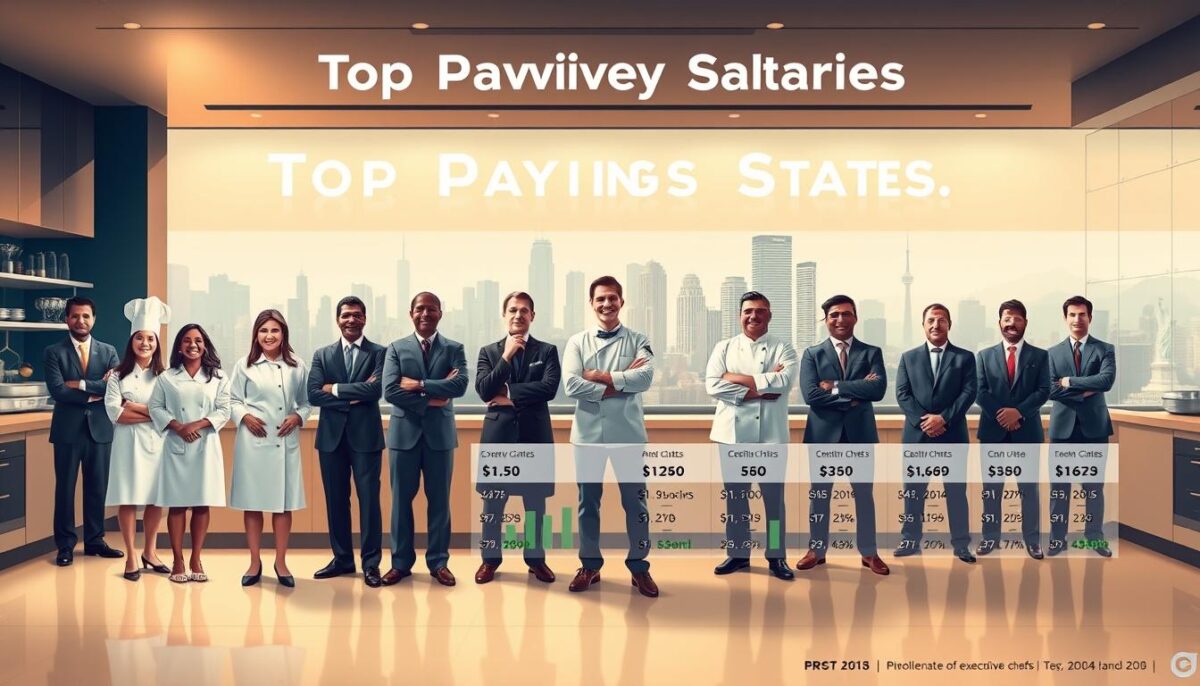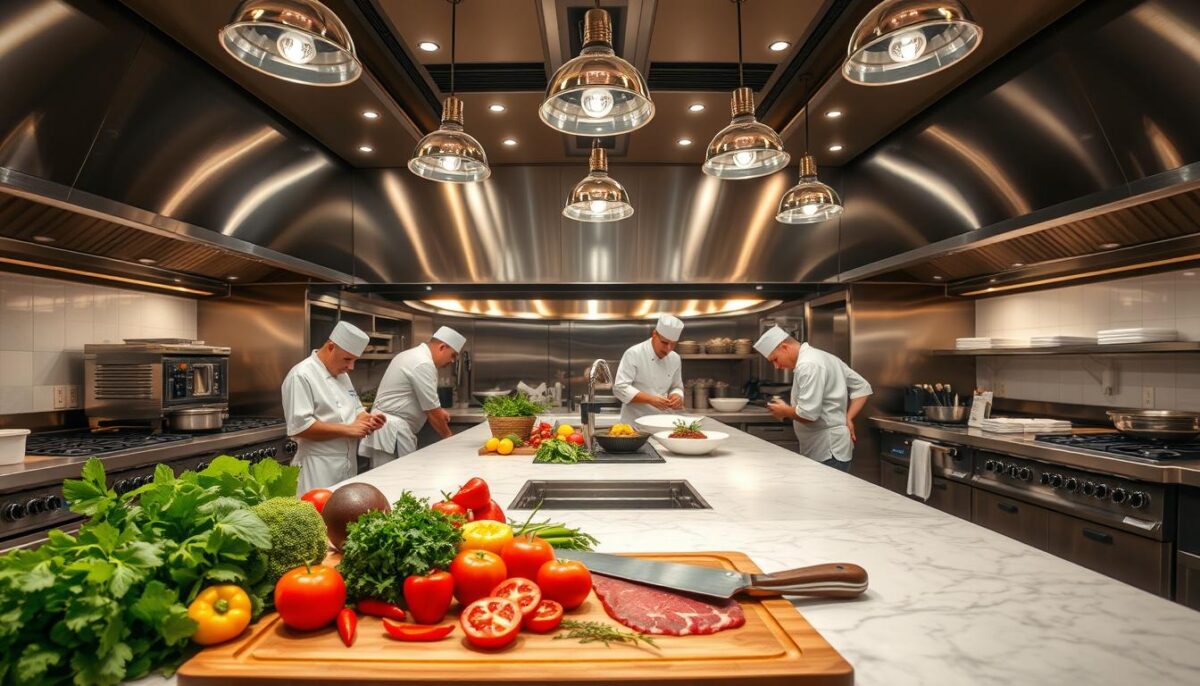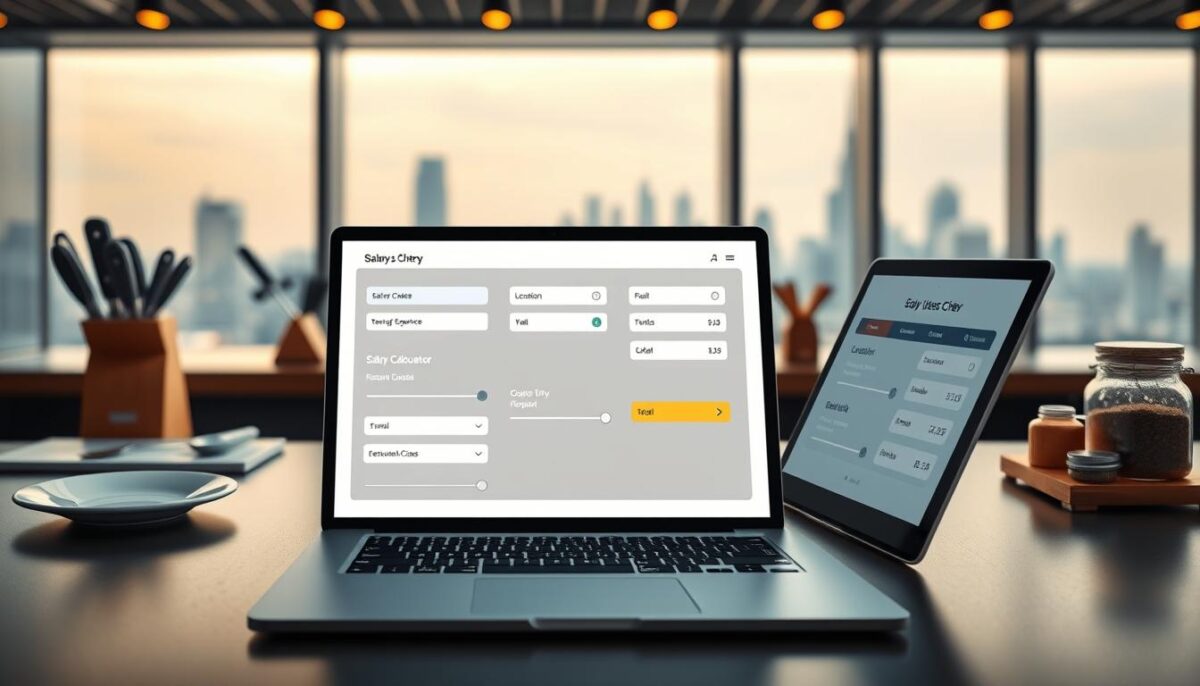
How to Become a Private Chef and Land High-Paying Clients
June 26, 2025
Culinary School vs Apprenticeship: Which Path Builds a Better Chef Career?
June 27, 2025As I reflect on my journey as a culinary professional, I recall a talented executive chef who transformed a struggling restaurant into a culinary hotspot, simply by refining the menu and motivating the kitchen staff. This transformation not only elevated the dining experience but also significantly impacted the chef’s salary. Did you know that executive chefs in the United States earn an average of $72,022 to $80,040 per year? The disparity in pay across different states is striking, with some regions offering much higher compensation than others.
Understanding the factors that influence chef salaries is crucial for culinary professionals seeking new opportunities or career advancement. What makes some states more lucrative for top chefs than others?
Key Takeaways
- Average salary ranges for executive chefs in the United States
- Factors influencing salary variations across states
- Top-paying states for culinary professionals
- Negotiation strategies for maximizing earning potential
- Industry trends shaping executive chef compensation in 2025
The Current Landscape of Executive Chef Salaries in America
As we dive into the current landscape of executive chef salaries, a complex picture emerges. The culinary industry is dynamic, with salaries influenced by factors such as location, experience, and the type of establishment. In 2025, the average executive chef salary reflects both the challenges and opportunities in this field.
National Average Salary for Executive Chefs
The national average salary for executive chefs in 2025 stands at $72,022 annually. This figure is derived from a range that typically falls between $51,000 and $102,000, depending on various factors. The average base salary serves as a foundational element in understanding the total compensation package for executive chefs.
Hourly and Weekly Wage Breakdown
Breaking down the average salary into hourly and weekly wages provides further insight. Executive chefs earn an average of $38.48 per hour, which translates to approximately $1,539.23 per week. On a monthly basis, this amounts to around $6,670. Understanding these figures helps in grasping the total compensation, including bonuses and profit-sharing, which can significantly impact the overall earnings.
Top-Paying States for Executive Chef Positions
The top-paying states for executive chefs in the United States offer salaries that significantly exceed the national average. These states are primarily known for their thriving hospitality and culinary industries.
Nevada: The Hospitality Hub
Nevada stands out as the top-paying state, with executive chefs earning an average of $97,600 per year. This is largely due to Las Vegas’s booming hospitality sector and high-end casino restaurants.
California: Culinary Innovation Center
California is another top-payer, with its unique culinary landscape combining innovative food scenes in San Francisco and Los Angeles. The abundance of local produce creates premium opportunities for executive chefs.
New York: Fine Dining Mecca
New York, particularly Manhattan, is renowned for fine dining. Prestigious restaurants and demanding clientele drive executive chef salaries significantly higher than the national average.

Cities Where Executive Chefs Command Premium Salaries
The compensation for executive chefs is influenced by the city’s culinary reputation and economic factors. Certain metropolitan areas stand out for offering significantly higher salaries to these culinary professionals.
New York City: The Culinary Capital
New York City remains the undisputed culinary capital of America, where executive chefs can command salaries significantly above the national average. The city’s competitive restaurant scene, coupled with its wealthy clientele, creates an environment where top culinary talent is in high demand. Manhattan’s concentration of Michelin-starred restaurants, luxury hotels, and corporate dining facilities further enhances earning opportunities for executive chefs with proven track records.
Los Angeles: Entertainment Industry Influence
Los Angeles, as a major entertainment industry hub, offers unique opportunities for chefs to benefit from celebrity connections, high-profile catering events, and exclusive restaurant openings. The influence of food media, television, and social media presence in the city can substantially boost an executive chef’s market value and compensation package.
Here’s a comparison of average salaries for executive chefs in these premium cities:
| City | Average Annual Salary | Cost of Living Index |
|---|---|---|
| New York City | $80,000 – $120,000 | 187.2 |
| Los Angeles | $75,000 – $110,000 | 146.4 |
| Chicago | $60,000 – $90,000 | 103.8 |
While cities like New York and Los Angeles offer premium salaries, other metropolitan areas provide competitive compensation with different cost-of-living considerations. Executive chefs can strategically plan their career paths to include experience in these high-paying cities to maximize their long-term earning potential.
Key Factors Influencing Executive Chef Salaries
The salary of an executive chef is influenced by a combination of factors that can greatly affect their total compensation. Understanding these elements is crucial for both employers and employees in the culinary industry.
Experience Level Impact
An executive chef’s experience level significantly impacts their earnings. Professionals with 10+ years of experience can earn up to $86,386 per year, which is 30% more than entry-level positions ($66,365). This highlights the importance of experience in determining chef salaries.
Establishment Type and Prestige
The type and prestige of the establishment also play a crucial role in determining executive chef salaries. Luxury hotels, high-end resorts, and prestigious restaurant groups offer premium compensation packages ranging from $110,000 to $181,000 to attract and retain top culinary talent.
Geographic Location Considerations
Geographic location significantly affects chef salaries, with tourist destinations offering substantially higher compensation than rural areas. Factors such as local cost of living and regional food cultures also create salary variations within the same state.

Understanding Your Take-Home Pay as an Executive Chef
The actual take-home pay for executive chefs can vary significantly across different states due to varying tax structures. As an executive chef, it’s essential to understand how these differences impact your net income.
Tax Implications by State
State income tax rates create significant variations in take-home pay for executive chefs earning identical gross salaries. For instance, some states have no income tax, while others have rates exceeding 10%. This disparity can substantially affect your compensation package.
Using Salary Calculators for Accurate Estimates
Paycheck calculators can help executive chefs determine their actual earnings after taxes and insurance premiums. By inputting your salary, pay frequency, and state of employment, you can get a more accurate estimate of your take-home pay. Utilizing these tools can help you make informed decisions about your career
Comprehensive Benefits Package for Executive Chefs
The role of an executive chef comes with a multitude of benefits that contribute to their overall financial well-being. These benefits not only enhance their compensation but also provide a better work-life balance and opportunities for professional growth.
Standard Benefits
Executive chefs typically receive 18 days of paid time off after one year of service, along with comprehensive health insurance coverage. This is particularly valuable given the physical demands of kitchen work.
Industry-Specific Perks
The culinary industry offers unique perks, including meal discounts, uniform provisions, and knife allowances. Executive chefs may also enjoy discounts at affiliated restaurants or hotel properties, adding value to their role.
Financial Incentives
Financial incentives for executive chefs often include profit-sharing plans and performance-based bonuses. These can significantly increase total compensation and are often tied to restaurant performance or individual achievements.
| Benefit Type | Description | Average Value |
|---|---|---|
| Paid Time Off | Annual leave after one year of service | 18 days |
| Health Insurance | Comprehensive coverage for chefs | Varies |
| Meal Discounts | Discounts on meals at affiliated restaurants | 50% off |
By understanding these benefits, executive chefs can better evaluate and negotiate their complete compensation packages, going beyond just their base salary figures.
How Executive Chef Salaries Compare to Other Culinary Positions
As I explore the culinary career ladder, I notice that executive chef salaries compare favorably to other positions. With a median salary of $80,040, executive chefs earn significantly more than many other culinary professionals.
Salary Comparison with Sous Chefs and Pastry Chefs
Executive chefs outearn sous chefs ($56,013) and pastry chefs ($54,995) by a substantial margin. Sushi chefs, with a median salary of $58,909, also earn less than executive chefs. However, private chefs can earn more than executive chefs, indicating that specialized roles may offer higher compensation.
Career Progression and Salary Growth
Career progression in the culinary industry typically moves from line cook to sous chef and then to executive chef. Each step brings significant salary increases. Specialized culinary education, certifications, and competition credentials can accelerate career advancement and salary growth. By strategically planning their career moves, ambitious culinary professionals can maximize both skill development and salary growth over time.
Understanding the salary differences between various culinary roles can help professionals make informed decisions about their career paths. While executive chef roles offer competitive salaries, other positions may provide better work-life balance or more creative freedom.
- Executive chefs earn $80,040, significantly more than sous chefs and pastry chefs.
- Career progression typically involves moving from line cook to sous chef to executive chef.
- Specialized education and certifications can accelerate career advancement and salary growth.
Negotiating a Higher Executive Chef Salary in 2025
Negotiating a higher executive chef salary involves leveraging key performance metrics and customer satisfaction data. To effectively negotiate, executive chefs must be prepared to demonstrate their value to employers.
Leveraging Performance Metrics
To negotiate a higher salary, executive chefs can use performance metrics such as food cost percentages, labor cost control, and revenue growth. By quantifying kitchen performance, chefs can demonstrate their impact on the bottom line.
Showcasing Customer Satisfaction
Customer satisfaction is a critical factor in salary negotiations. Executive chefs can gather positive customer reviews, repeat business statistics, and direct testimonials to demonstrate their value.
Researching Competitive Compensation
Researching competitive salary data is essential for determining fair compensation. Executive chefs can consult industry salary guides, network with peers, and analyze job postings to establish accurate benchmarks.
To enhance overall compensation, executive chefs can negotiate beyond base salary, including performance bonuses, schedule flexibility, and professional development opportunities.
Conclusion: Maximizing Your Earning Potential as an Executive Chef
Executive chef salaries in 2025 vary greatly, reflecting the complex interplay of geographic location, establishment prestige, and personal experience. To maximize earning potential, culinary professionals should focus on strategic career planning, skill development, and effective negotiation. It’s crucial to look beyond base salary and consider comprehensive compensation packages, including benefits and bonuses.
Emerging trends like private dining and culinary media may create new high-paying opportunities. By understanding these factors and using the salary data provided, chefs can advocate for fair compensation that reflects their true market value, balancing financial considerations with creative fulfillment and work-life balance.
FAQ
What is the average salary for a top chef in the United States?
The average annual salary for an executive chef in the U.S. is around ,000, but this figure can vary significantly based on factors like location, experience, and type of establishment.
How does experience impact my salary as a chef?
As I gain more experience in the kitchen, my earning potential increases. Typically, chefs with more than 5 years of experience can earn higher salaries, with some reaching upwards of 0,000 per year.
Do chefs in certain states earn more than others?
Yes, certain states like Nevada, California, and New York tend to offer higher salaries for chefs due to their strong hospitality and fine dining industries.
Are there any additional benefits I should expect as an executive chef?
In addition to my base salary, I can expect benefits like paid time off, health insurance, meal discounts, and potentially even profit sharing or bonuses, depending on the establishment.
How can I negotiate a higher salary as an executive chef?
To negotiate a higher salary, I should research competitive compensation, leverage my performance metrics, and showcase customer satisfaction to demonstrate my value to the employer.
Can I use salary calculators to estimate my take-home pay?
Yes, using salary calculators can help me get an accurate estimate of my take-home pay by taking into account factors like taxes, benefits, and other deductions.



